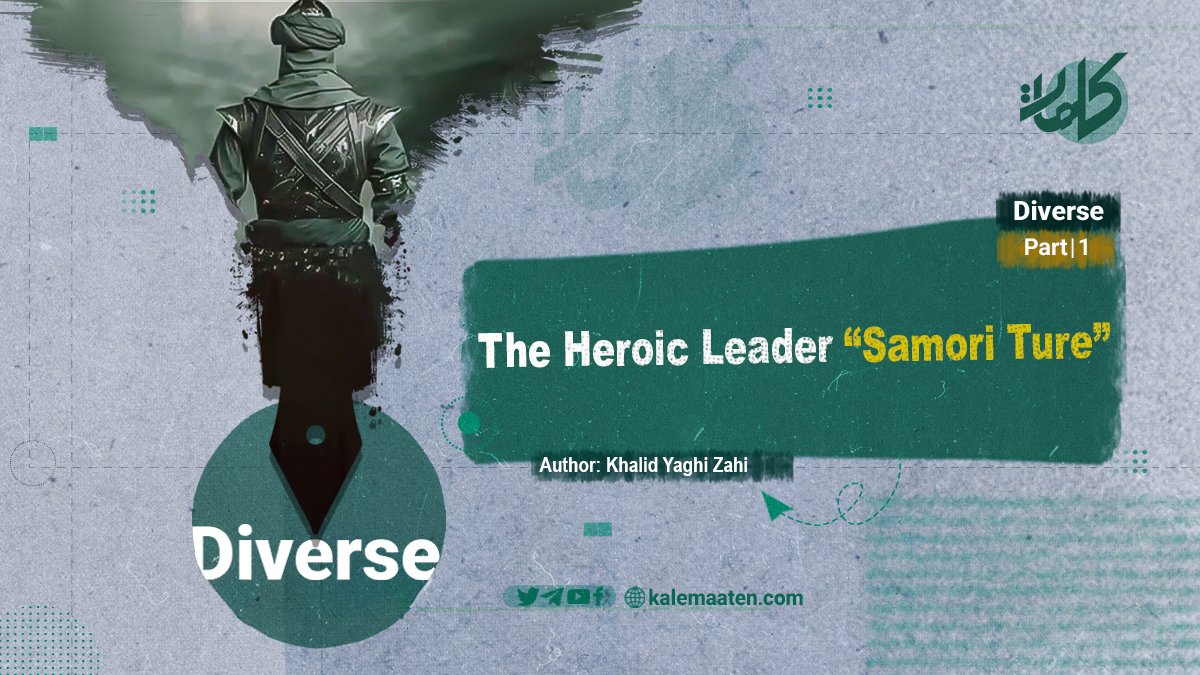
Author: Khalid Yaghi Zahi
The Heroic Leader “Samori Ture” (Part One)
During the 13th century AH / 19th century CE, Western powers set their sights on Africa, seeking to conquer and divide the continent among themselves. The French occupied Algeria, Tunisia, Morocco, and Mauritania, while the British took control of Egypt. However, their ambitions did not stop there; they pushed further into the heart of Africa, partitioning it among themselves.
As a result, the Niger River region fell under French control—but not without fierce resistance from the great Imam and formidable warrior, Samori Ture.
The name “Ture” belongs to a tribe that resided in the city of Djenné, in the heart of the Islamic Empire of Mali. When the Songhai Empire replaced the Mali Empire, the Ture tribe left Djenné and migrated northward toward present-day Nigeria.
Samori was born in Sanankoro, near the city of Bissandugu, the French military base. This town was situated on the highlands of the Milo River, a tributary of the Niger River. While no exact birth date is recorded, historians estimate that he was born between 1246–1251 AH (1830–1835 CE). He received his early education from his father before being placed under the tutelage of a respected Islamic scholar. Some reports suggest that Samori’s parents were initially non-Muslims and that he later converted to Islam himself. Wallahu a‘lam (Allah knows best).
One of the most extraordinary stories about his military training recounts how an African ruler named Sori Birama, king of Bissandugu, captured his mother. The condition for her release was that Samori had to serve in his army for a period of time. Thus, Samori spent seven years in his service, during which he mastered warfare, strategic negotiations, and battlefield tactics.
By 1862, he had gathered a group of young warriors under his command, laying the foundation for what would become his state. His territory gradually expanded, starting from pagan regions and extending westward to the Fouta Djallon highlands and northward to the borders of Bori. Many merchants supported his cause, and his relatives accepted him as their leader, pledging allegiance to him. Over time, he successfully incorporated the city of Kankan into his realm, subdued the Sisse warriors, and crushed the pagan forces in northern Kouroussa.
On July 25, 1884, which coincided with Ramadan, Samori gathered his family and allies, proclaiming himself Imam. He urged his followers to embrace Islam, and in November of that year, he banned the sale and consumption of alcohol, abolished pagan customs, and enforced Islamic laws across his state.
His army was predominantly infantry-based, with a small cavalry unit equipped with modern weaponry. He obtained these arms from the British in Freetown (Sierra Leone) in exchange for gold, ivory, and the release of prisoners of war. His personal bodyguard consisted of 500 men, while his brother, Malinke Ture, commanded a force of 200 cavalry and 1,000 infantry soldiers.
The French sought to dominate all lands along the Niger River, but Allah placed this heroic warrior in their path, inflicting upon them severe financial and military losses—far greater than they had anticipated. One of their commanders, Peroz, even dubbed Samori the “Napoleon of Sudan.” Yet, this title barely captured his greatness, for he waged a relentless 13-year jihad against the French, astounding them with his resilience. Despite having far fewer resources than his enemy, Samori proved that when faith takes root in the heart, nothing can overcome it.
However, his struggle was not only against the French; he also faced betrayal from a supposed Muslim ruler who allied with the French against him. This tragic pattern has often repeated itself in Islamic history, particularly in Andalusia and parts of North Africa ( إنا لله وإنا إليه راجعون).
This individual, Tieba, the ruler of Kenedougou, became Samori’s fiercest local enemy. He frequently fought alongside the French, launching attacks from one side while the French assaulted from the other—trapping Samori’s army between a hammer and an anvil.
Throughout history, the collaboration of Muslim rulers with Islam’s enemies has inflicted devastating blows on the Ummah, causing irreparable harm and delighting the foes of Islam.
The Establishment of Samori’s State and His Remarkable Resistance
Samori declared Bissandugu as the capital of his state, making it a center for jihad against Islam’s adversaries and the enforcement of Sharia law. This decision revitalized his forces, compelling the neighboring British to negotiate peace with him, allowing him to focus on fighting the French and Tieba.
He organized his military into three divisions:
1. The strongest and largest division faced the French.
2. The second division was responsible for maintaining internal security.
3. The third division expanded the state’s territory, eradicated pagan practices, and spread Islam.
A remarkable aspect of his strategy was his ability to manufacture modern weapons. His forces used these arms both against French invaders and local marauders. Additionally, he acquired firearms from Freetown, Sierra Leone.
Samori instructed tribal elders to enlist capable men into his army. During peacetime, his reserve forces worked in agriculture for six months, earning a living while remaining available for military service. If their service was not immediately needed, they were granted another six months of leave. Through this system, Samori successfully implemented a national conscription plan that balanced both faith and livelihood.
His state boasted a population of 1.25 million people, structured into 162 provinces, each containing 20 villages. Every village had a local governor, while each province had a wali (governor). However, above all administrators stood the Imam, who was tasked with promoting Islam, eradicating paganism, strengthening the state, and defending it.
Samori built numerous mosques and established many Islamic schools, dispatching scholars and preachers to different parts of his domain. He also prioritized Qur’an memorization, ensuring that Islamic education flourished within his state.
Continues…


